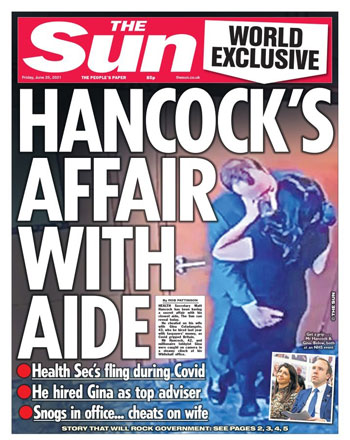
If you apply the ‘How It Started vs How It’s Going’ meme to the UK government and press freedom, you can say it began on a high with a global conference in London pledging to defend the media worldwide.
The conference in July 2019 cost £2.4 million and promoted a “Global Campaign for Media Freedom” with the ambitious aim to shine a spotlight on media abuses around the world and reverse the growing trend of violence against journalists.
It was a joint initiative by the Foreign Office under Jeremy Hunt and the Canadian government and had high profile speakers like Amal Clooney, the UK’s special envoy on press freedom. Hunt promised the UK government would ensure whenever it proposed or amended a law, it would consider the potential impact on press freedom.
Within weeks, some of the shine came off the glossy conference when Hunt was out after he lost the Conservative leadership election to Boris Johnson and refused to be reshuffled from the Foreign Office. Then, in September 2020, Clooney quit as press freedom envoy “in dismay” at the government's willingness to break international law over Brexit with the Internal Market Bill.
It is too important a principle to hang on the assurances of a prime minister whose word has not always been his bond.
The Times
Threat of prison
So how is it going for the government since the conference? When you have the national press from the Sun to the Financial Times all urging you to drop proposals in a consultation on revising the Official Secrets Act, which press freedom campaigners believe will have a chilling impact on whistleblowers and journalists, the answer is not very well.
What alarmed journalists was this recommendation: “Although there are differences in the mechanics of and motivations behind espionage and unauthorised disclosure offences, there are cases where an unauthorised disclosure may be as or more serious, in terms of intent and / or damage.” Or as headline writers would put it: ‘Journalists to be treated like spies.’
Prison sentences of up to fourteen years for such offences of unauthorised disclosures have been suggested. The consultation also proposes to increase police powers when searching journalists’ belongings. The Law Commission had argued a public interest defence which would protect journalists and whistleblowers should be included in the proposals, but this was rejected by the Home Office.
In a PR nightmare for the government, the press didn’t have to look far for an example of a whistleblower acting in the public interest when CCTV film was passed to the Sun revealing Health Secretary Matt Hancock breaking his own lockdown rules in a “steamy clinch” with his adviser and lover Gina Coladangelo. Although Hancock admitted he was in the wrong and resigned, a hunt for the whistleblower began with a raid on two houses by the Information Commissioner’s Office and seizure of computers in a data breach investigation.

Sun editor-in-chief Victoria Newton told readers: “Under sweeping reforms to the Official Secrets Act, journalists could be sent to jail for writing or publishing stories handed to them by whistleblowers. And the whistleblowers themselves could also be exposed to harsh penalties for being brave enough to risk their job – or sometimes even their life – to bring vital information forward to the media.
“It would mean editors like me – or from any newspaper, TV or radio organisation – could be treated like foreign spies and handed a long jail sentence if we handle leaked information. Stories like The Sun’s exposé of Matt Hancock breaking his own social distancing rules would be deemed a criminal leak of an official secret – something the public had no right to know. Our reporters, myself and the brave whistleblowers would be jailed.”
The Sun suggested stories from whistleblowers that would not be published under the new proposals included: the MPs’ expenses scandal; Iraq War army shortages; baby deaths at Bristol Royal Infirmary; and care failures at Staffordshire Hospital.
Boris Johnson, interviewed by Nick Ferrari on LBC, claimed: “We don’t want to have a world in which people are prosecuted for doing what they think is in the public interest. I’m full of admiration for the way journalists generally conduct themselves. Whatever this thing is, I don’t for one minute think it is going to interrupt the normal process.” He added one man’s whistleblower was another’s “treacherous betrayer”.
Johnson’s comments did not reassure the press. As The Times put it in a leader: “He declined to be drawn on which category the leaker of the mortifying Matt Hancock clinch video might fall into. This is not a distinction for the government to decide. It is precisely why the public interest defence exists. It is too important a principle to hang on the assurances of a prime minister whose word has not always been his bond.”
Press freedom campaign group Reporters Without Borders described the Downing Street response as “Trumpian”.
Avoiding scrutiny
Even before the row over the Official Secrets Act, which could yet see a government climbdown given the strength of media opposition to the proposals, there were other strains in the relationship with the press. The government is highly selective in the media it engages with. Johnson refused to be interviewed by Andrew Neil on the BBC, while senior ministers have variously boycotted Radio 4’s Today programme, ITV’s Good Morning Britain, Newsnight and Channel 4 News. The government has also bypassed the press and gone direct to the public via social media.
Sky News’ Adam Boulton writing in the Sunday Times claimed: “Johnson proudly told MPs: ‘I am a journalist’, but his career in print was notable for its partisan brio rather than devotion to facts. As prime minister, he has gone along with avoiding interviews and question-and-answer sessions. He has threatened the BBC and political journalists with radical change. As shown with his Brexit night video, he has expanded the government payroll to include technicians capable of getting his message out on social media without calling in independent MSM professionals.”
A Downing Street spokesman asked questions about the prime minister’s chief adviser Dominic Cummings by the Guardian and Mirror in May last year responded: “We will not waste our time answering a stream of false allegations about Mr Cummings from campaigning newspapers.” The Society of Editors condemned the move, saying: “At a time when the government is heading the Global Campaign for Media Freedom, this is hardly a shining example to set.” Press freedom campaign group Reporters Without Borders described the Downing Street response as “Trumpian”.
Earlier in February, there was a clash with political journalists in the lobby who walked out when there was an attempt to bar several colleagues from a press briefing with Brexit negotiator Lord Frost.
The prime minister has criticised the BBC, under pressure over licence fee negotiations, for “a great deal of instinctual metropolitan bias in the BBC newsroom” and being out of touch with pro-Brexit voters. The BBC has also come under fire from Conservatives in the “culture war” who accuse it of being “woke” and only hiring left-wing journalists, leading to attempts to block BBC News from hiring former Huff Post UK editor Jess Brammar because she was a “Brexit basher”. Meanwhile, the government’s decision to consider privatising Channel 4 is seen by some as politically motivated by Conservatives who don’t like the channel and consider its news service biased.
The UK has witnessed a case of press freedom being violated by a police raid on journalists of a type it would condemn if carried out in a totalitarian regime. In November last year, the Police Service of Northern Ireland paid £875,000 in a settlement to journalists Trevor Birney and Barry McCaffrey. They were arrested in front of their families in an early morning raid in 2018 on suspicion of stealing a secret report and had their homes and offices searched and material seized. The raid came after they made the documentary ‘No Stone Unturned’ about the murder of six Catholics during the Troubles and questioned contacts between the police and the alleged killers. Birney said, “It was a dark cloud hanging over us for two years. It was an egregious attack not only on us but on journalism. It was designed as a chill factor to put journalists off investigating these stories.”
It was an egregious attack not only on us but on journalism. It was designed as a chill factor to put journalists off investigating these stories.
Trevor Birney
Libel laws
The “chill factor” continuing to act against press freedom in the UK is the fear of the libel courts. The Financial Times in a leader warned: “Despite reforms curtailing so-called libel tourism, England remains a venue of choice for claimants. Unlike in the US, there is no constitutional protection of free speech… Claimants must be able to vindicate their rights in court where claims are well founded. But the costs of the current system hand the super-rich an advantage and can distort outcomes.”
A worrying case for journalists is the libel proceedings against former Financial Times Moscow correspondent Catherine Belton’s highly regarded book: Putin's People. Belton and publisher HarperCollins are being sued by billionaire oligarchs and a Russian state-owned oil company in the London courts.
The government has a reputation for secrecy. In June this year, the independent media organisation openDemocracy won a legal victory against the government in a judgment that forces transparency on a secretive Cabinet Office “clearing house” unit accused of blacklisting Freedom of Information requests from journalists. The Times noted: “There are increasing concerns about the department’s policy of stonewalling requests from journalists and the public until being ordered to respond by the regulator. In doing so, it has been accused of failing to meet its obligation in either the letter or the principle of the Freedom of Information Act. The result has been that successful requests have fallen to the lowest level since the law was introduced twenty years ago.”
All governments try and control how they are perceived in the press, but if you are to loftily lecture the rest of the world about “Global Media Freedom”, maybe you should set a better example on the ground at home. The UK government could start by being more open to scrutiny and transparency, less prone to having media favourites and attacking public service broadcasters as well as being careful not to introduce legislation that restricts journalism and punishes whistleblowers.
Despite reforms curtailing so-called libel tourism, England remains a venue of choice for claimants.
The FT
This article was first published in InPublishing magazine. If you would like to be added to the free mailing list, please register here.










